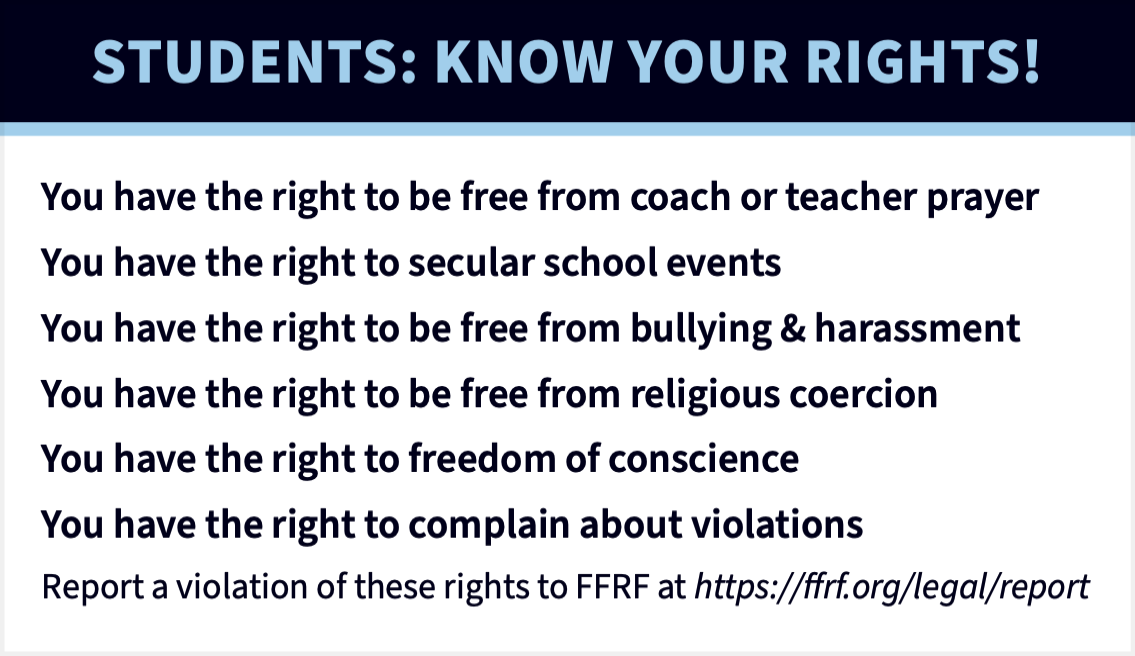In 2022 the U.S. Supreme Court issued a series of opinions affecting our civil rights, including one decision in a case involving coach prayer at public school athletic events. The court’s decision focused entirely on the rights of the coach and ignored the rights of students to be free from religious proselytizing and indoctrination in public schools. This brochure outlines the rights you still have as a student to be free from religion in your public school.
You have the right to be free from coach or teacher prayer
As a student, you have the right to fully participate in your public education free from school-sponsored religious pressure or indoctrination. This means that coaches may not conduct prayer or lead any other religious exercise when acting in their role as coach. A coach cannot encourage or require you to pray. Additionally, a coach cannot lead religious talks or preach to players. As a student, you also have the right to participate in all team-related activities without coaches subjecting you to prayers or their religious beliefs.
Like coaches, teachers may not conduct prayer or lead any religious exercise during class or when acting in their official capacity as a teacher. For instance, a teacher who is monitoring the cafeteria during lunch cannot attempt to lead students in prayer or proselytize students just because it is not technically during a class; the teacher is still acting in an official capacity as a public school employee.
You have the right to secular school events
Students have the right to attend and participate in school events, including graduation, without being forced to observe or participate in school-sponsored prayer or any other religious exercise. Schools cannot include prayer as an official part of a graduation ceremony or any other school-sponsored event, such as athletic games, award banquets, and assemblies. This means, for example, that a school cannot arrange for a student to lead a prayer over the loudspeaker before a football game.
You have the right to be free from bullying & harassment
You have the right to be free from bullying and harassment by your teachers and coaches. A public school employee may not single out, bully or harass a student for refusing to participate in a prayer, for dissenting from the religious majority or for holding a belief (or lack of belief) that the school employee disagrees with. Bullying and harassment can look like:
- A teacher making a snide remark after you express a nonreligious viewpoint.
- A coach “making an example” out of you in front of your teammates because you refuse to participate in a locker room prayer.
- A teacher referring to you by any derogatory name or term related to your status as nonreligious or a religious minority.
You have the right to be free from religious coercion
Coercion occurs when an authority figure pressures a student to participate in something. No public school employee, including teachers and coaches, may coerce or attempt to coerce students into believing in a religion, participating in prayer or performing any other religious activity. Coercion can be both direct and indirect, and it can look different depending on the situation. Direct coercion could include a teacher telling students they must attend a religious event as part of their grade or a coach telling players to gather for a mandatory team huddle that includes prayer.
However, coercion can involve more than directly forcing students to pray. Teachers and coaches are authority figures with immense power over the lives of their students, such as their grades, playing time and college prospects. Therefore, “suggestions” by coaches or teachers are often taken as commands. Students inevitably feel subtle pressure to participate in religious exercises promoted by these authority figures, whether or not they are explicitly “required” to do so. This is indirect coercion.
The First Amendment’s Establishment Clause and Free Exercise Clause dually guarantee that students have the right to be free from public school employees coercing them, directly or indirectly, into participating in any type of religious activity.
You have the right to freedom of conscience
Embodied in all of these rights is the absolute right to freedom of conscience. This means that as a student, you have the right to hold nonreligious or religious views alike without interference or influence from your school. For example, you generally have the right to pray privately in school as long as you are not disrupting or interfering with classes or school activities, or using prayer to harass other students. You have the right to stay seated during or not participate in recitation of the religious Pledge of Allegiance. You have the right to an education that is free from religious bullying or intimidation.
You have the right to complain about violations
The Freedom From Religion Foundation receives and acts upon thousands of violations of the constitutional separation between state and church each year. More than half of these are violations of the rights of students in our nation’s public schools. You can report a violation to us by clicking here.

Download the Know Your Rights card here
Freedom From Religion Foundation
PO Box 750, Madison WI 53701
(608) 256-8900
The Freedom From Religion Foundation is a 501(c)(3) educational nonprofit with more than 37,000 members nationwide and regional chapters across the country. FFRF’s purposes are to defend the constitutional principle of separation between state and church and to educate the public on matters relating to nontheism.
